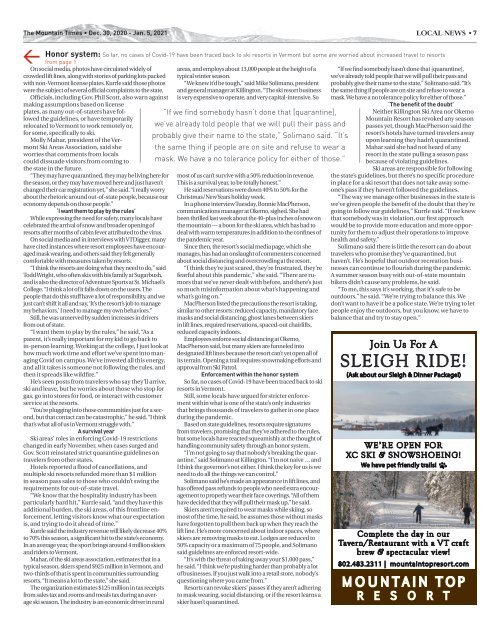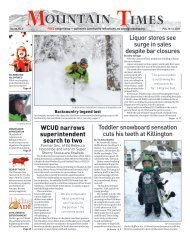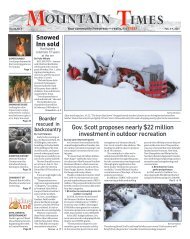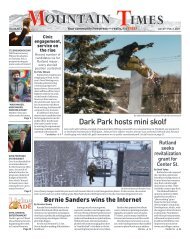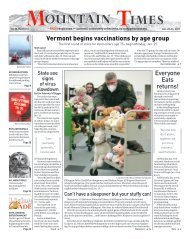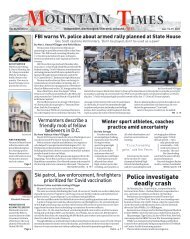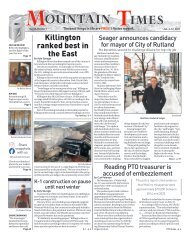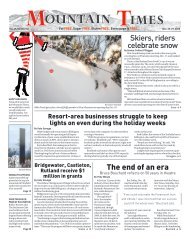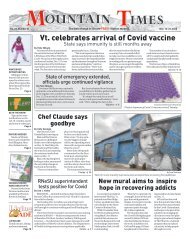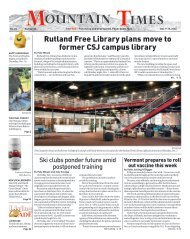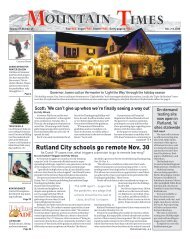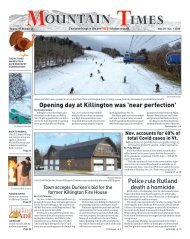Mountain Times - Vol. 49, No. 53 - Dec. 30, 2020 - Jan 2, 2021
Create successful ePaper yourself
Turn your PDF publications into a flip-book with our unique Google optimized e-Paper software.
The <strong>Mountain</strong> <strong>Times</strong> • <strong>Dec</strong>. <strong>30</strong>, <strong>2020</strong> - <strong>Jan</strong>. 5, <strong>2021</strong> LOCAL NEWS • 7<br />
Honor system: So far, no cases of Covid-19 have been traced back to ski resorts in Vermont but some are worried about increased travel to resorts<br />
><br />
from page 1<br />
On social media, photos have circulated widely of<br />
crowded lift lines, along with stories of parking lots packed<br />
with non-Vermont license plates. Kurrle said those photos<br />
were the subject of several official complaints to the state.<br />
Officials, including Gov. Phil Scott, also warn against<br />
making assumptions based on license<br />
plates, as many out-of-staters have followed<br />
the guidelines, or have temporarily<br />
relocated to Vermont to work remotely or,<br />
for some, specifically to ski.<br />
Molly Mahar, president of the Vermont<br />
Ski Areas Association, said she<br />
worries that comments from locals<br />
could dissuade visitors from coming to<br />
the state in the future.<br />
“They may have quarantined, they may be living here for<br />
the season, or they may have moved here and just haven’t<br />
changed their car registration yet,” she said. “I really worry<br />
about the rhetoric around out-of-state people, because our<br />
economy depends on those people.”<br />
‘I want them to play by the rules’<br />
While expressing the need for safety, many locals have<br />
celebrated the arrival of snow and broader opening of<br />
resorts after months of cabin fever attributed to the virus.<br />
On social media and in interviews with VTDigger, many<br />
have cited instances where resort employees have encouraged<br />
mask wearing, and others said they felt generally<br />
comfortable with measures taken by resorts.<br />
“I think the resorts are doing what they need to do,” said<br />
Todd Wright, who often skis with his family at Sugarbush,<br />
and is also the director of Adventure Sports at St. Michael’s<br />
College. “I think a lot of it falls down on the users. The<br />
people that do this stuff have a lot of responsibility, and we<br />
just can’t shift it all and say, ‘It’s the resort’s job to manage<br />
my behaviors.’ I need to manage my own behaviors.”<br />
Still, he was unnerved by sudden increases in drivers<br />
from out of state.<br />
“I want them to play by the rules,” he said. “As a<br />
parent, it’s really important for my kid to go back to<br />
in-person learning. Working at the college, I just look at<br />
how much work time and effort we’ve spent into managing<br />
Covid on campus. We’ve invested all this energy,<br />
and all it takes is someone not following the rules, and<br />
then it spreads like wildfire.”<br />
He’s seen posts from travelers who say they’ll arrive,<br />
ski and leave, but he worries about those who stop for<br />
gas, go into stores for food, or interact with customer<br />
service at the resorts.<br />
“You’re plugging into those communities just for a second,<br />
but that contact can be catastrophic,” he said. “I think<br />
that’s what all of us in Vermont struggle with.”<br />
A survival year<br />
Ski areas’ roles in enforcing Covid-19 restrictions<br />
changed in early <strong>No</strong>vember, when cases surged and<br />
Gov. Scott reinstated strict quarantine guidelines on<br />
travelers from other states.<br />
Hotels reported a flood of cancellations, and<br />
multiple ski resorts refunded more than $1 million<br />
in season pass sales to those who couldn’t swing the<br />
requirements for out-of-state travel.<br />
“We know that the hospitality industry has been<br />
particularly hard hit,” Kurrle said, “and they have this<br />
additional burden, the ski areas, of this frontline enforcement,<br />
letting visitors know what our expectation<br />
is, and trying to do it ahead of time.”<br />
Kurrle said the industry revenue will likely decrease 40%<br />
to 70% this season, a significant hit to the state’s economy.<br />
In an average year, the sport brings around 4 million skiers<br />
and riders to Vermont.<br />
Mahar, of the ski areas association, estimates that in a<br />
typical season, skiers spend $925 million in Vermont, and<br />
two-thirds of that is spent in communities surrounding<br />
resorts. “It means a lot to the state,” she said.<br />
The organization estimates $125 million in tax receipts<br />
from sales tax and rooms and meals tax during an average<br />
ski season. The industry is an economic driver in rural<br />
areas, and employs about 13,000 people at the height of a<br />
typical winter season.<br />
“We knew it’d be tough,” said Mike Solimano, president<br />
and general manager at Killington. “The ski resort business<br />
is very expensive to operate, and very capital-intensive. So<br />
“If we find somebody hasn’t done that [quarantine],<br />
we’ve already told people that we will pull their pass and<br />
probably give their name to the state,” Solimano said. “It’s<br />
the same thing if people are on site and refuse to wear a<br />
mask. We have a no tolerance policy for either of those.”<br />
most of us can’t survive with a 50% reduction in revenue.<br />
This is a survival year, to be totally honest.”<br />
He said reservations were down 40% to 50% for the<br />
Christmas/New Years holiday week.<br />
In a phone interview Tuesday, Bonnie MacPherson,<br />
communications manager at Okemo, sighed. She had<br />
been thrilled last week about the 40-plus inches of snow on<br />
the mountain — a boon for the ski area, which has had to<br />
deal with warm temperatures in addition to the confines of<br />
the pandemic year.<br />
Since then, the resort’s social media page, which she<br />
manages, has had an onslaught of commenters concerned<br />
about social distancing and overcrowding at the resort.<br />
“I think they’re just scared, they’re frustrated, they’re<br />
fearful about this pandemic,” she said. “There are rumors<br />
that we’ve never dealt with before, and there’s just<br />
so much misinformation about what’s happening and<br />
what’s going on.”<br />
MacPherson listed the precautions the resort is taking,<br />
similar to other resorts: reduced capacity, mandatory face<br />
masks and social distancing, ghost lanes between skiers<br />
in lift lines, required reservations, spaced-out chairlifts,<br />
reduced capacity indoors.<br />
Employees enforce social distancing at Okemo,<br />
MacPherson said, but many skiers are funneled into<br />
designated lift lines because the resort can’t yet open all of<br />
its terrain. Opening a trail requires snowmaking efforts and<br />
approval from Ski Patrol.<br />
Enforcement within the honor system<br />
So far, no cases of Covid-19 have been traced back to ski<br />
resorts in Vermont.<br />
Still, some locals have argued for stricter enforcement<br />
within what is one of the state’s only industries<br />
that brings thousands of travelers to gather in one place<br />
during the pandemic.<br />
Based on state guidelines, resorts require signatures<br />
from travelers, promising that they’ve adhered to the rules,<br />
but some locals have reacted squeamishly at the thought of<br />
handling community safety through an honor system.<br />
“I’m not going to say that nobody’s breaking the quarantine,”<br />
said Solimano at Killington. “I’m not naive … and<br />
I think the governor’s not either. I think the key for us is we<br />
need to do all the things we can control.”<br />
Solimano said he’s made an appearance in lift lines, and<br />
has offered pass refunds to people who need extra encouragement<br />
to properly wear their face coverings. “All of them<br />
have decided that they will pull their mask up,” he said.<br />
Skiers aren’t required to wear masks while skiing, so<br />
most of the time, he said, he assumes those without masks<br />
have forgotten to pull them back up when they reach the<br />
lift line. He’s more concerned about indoor spaces, where<br />
skiers are removing masks to eat. Lodges are reduced to<br />
50% capacity or a maximum of 75 people, and Solimano<br />
said guidelines are enforced resort-wide.<br />
“It’s with the threat of taking away your $1,000 pass,”<br />
he said. “I think we’re pushing harder than probably a lot<br />
of businesses. If you just walk into a retail store, nobody’s<br />
questioning where you came from.”<br />
Resorts can revoke skiers’ passes if they aren’t adhering<br />
to mask wearing, social distancing, or if the resort learns a<br />
skier hasn’t quarantined.<br />
“If we find somebody hasn’t done that [quarantine],<br />
we’ve already told people that we will pull their pass and<br />
probably give their name to the state,” Solimano said. “It’s<br />
the same thing if people are on site and refuse to wear a<br />
mask. We have a no tolerance policy for either of those.”<br />
‘The benefit of the doubt’<br />
Neither Killington Ski Area nor Okemo<br />
<strong>Mountain</strong> Resort has revoked any season<br />
passes yet, though MacPherson said the<br />
resort’s hotels have turned travelers away<br />
upon learning they hadn’t quarantined.<br />
Mahar said she had not heard of any<br />
resort in the state pulling a season pass<br />
because of violating guidelines.<br />
Ski areas are responsible for following<br />
the state’s guidelines, but there’s no specific procedure<br />
in place for a ski resort that does not take away someone’s<br />
pass if they haven’t followed the guidelines.<br />
“The way we manage other businesses in the state is<br />
we’ve given people the benefit of the doubt that they’re<br />
going to follow our guidelines,” Kurrle said. “If we knew<br />
that somebody was in violation, our first approach<br />
would be to provide more education and more opportunity<br />
for them to adjust their operations to improve<br />
health and safety.”<br />
Solimano said there is little the resort can do about<br />
travelers who promise they’ve quarantined, but<br />
haven’t. He’s hopeful that outdoor recreation businesses<br />
can continue to flourish during the pandemic.<br />
A summer season busy with out-of-state mountain<br />
bikers didn’t cause any problems, he said.<br />
“To me, this says it’s working, that it’s safe to be<br />
outdoors,” he said. “We’re trying to balance this. We<br />
don’t want to have it be a police state. We’re trying to let<br />
people enjoy the outdoors, but you know, we have to<br />
balance that and try to stay open.”


